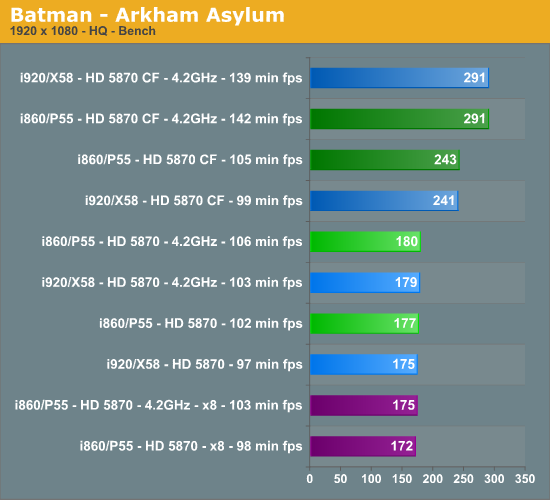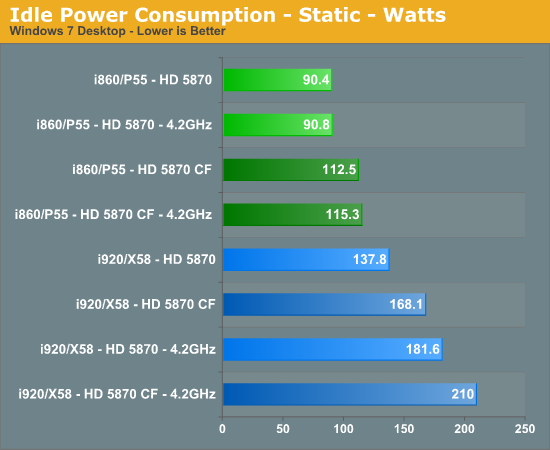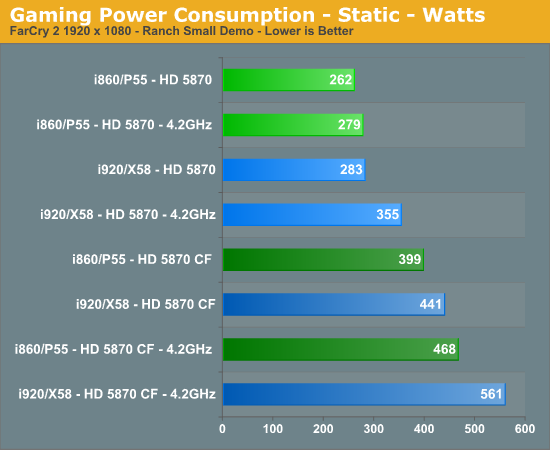ATI HD 5870 Scaling Performance: X58 vs P55 Showdown
by Gary Key on September 29, 2009 12:00 PM EST- Posted in
- Motherboards
One of our favorite new games is Batman - Arkham Asylum. We set all options as high as they will go and utilize the games built-in benchmark for our results. Both platforms are just stupid fast when running this game.

The single card results at x8 trails the x16 results by about 1% at stock and 3% when overclocked. Minimum frame rates for the x16 single card results are around 5% better on the P55 platform at stock and 3% when overclocked.
Batman – Arkham Asylum CrossFire Scaling – Average Frame Rates
| ATI HD 5870 CF Scaling | Batman – Arkham Asylum | Batman – Arkham Asylum 4.2GHz |
| Intel Core i7 920 (X58) | 37.7% | 62.6% |
| Intel Core i7 860 (P55) | 37.3% | 61.7% |
At stock and overclocked speeds, both platforms are practically tied when it comes to scaling in average frame rates.
Batman – Arkham Asylum CrossFire Scaling – Minimum Frame Rates
| ATI HD 5870 CF Scaling | Batman – Arkham Asylum | Batman – Arkham Asylum 4.2GHz |
| Intel Core i7 920 (X58) | 2.1% | 34.9% |
| Intel Core i7 860 (P55) | 7.1% | 33.9% |
Minimum frame rates favor the P55 by 6% and scaling favors the P55 by 5% in our stock results, while the X58 is slightly ahead in the overclocking test.
Power Consumption
Both systems have all power management features enabled and we utilize the Balanced Power option in Windows 7. Our 4.2GHz overclock setting has the Core i7 860 VCore offset option enabled with an ending voltage of 1.3875V. VTT is set to 1.310V, CPU PLL at 1.80V, and VDimm at 1.62V. The Core i7 920 offset is enabled for a final VCore reading of 1.335V. VTT is set to 1.375V, CPU PLL at 1.86V, and VDimm at 1.65V.

Idle power is Lynnfield's biggest ally and the Radeon HD 5870 plays well here. Even overclocked to 4.2GHz with a pair of 5870s, Lynnfield uses less power than a single 5870 on an i7 920. Bloomfield runs at a 12x multiplier at idle while Lynnfield runs at 9x. Bloomfield also likes to ramp up VTT voltage in a hurry compared to Lynnfield, the result is nearly zero impact at idle power consumption but when Bloomfield is overclocked, the platform just consumes more power thanks to additional circuitry.

Under load, once again, there's virtually no impact from CPU overclocking on Lynnfield compared to Bloomfield. At stock frequencies however, the GPU power dominates and thus there's less than a 10% power difference between X58 and P55.










85 Comments
View All Comments
vshin - Wednesday, September 30, 2009 - link
Gulftowns are supposedly -starting- at $1000 with upper-end parts going as high as $1500. Even at $500, that is still too high for the mainstream gamer. So is a $500 video card. If you have this much to spend, then you may as well spend extra for an X58 system.I'm referring to the budget-enthusiast who will want to limit their purchase to <$300 for CPU or video card, not going to use SLI, but plans on overclocking to maximize value. This segment is more interested in running games fast, and less interested in folding projects or encoding video.
The difference between me and TA is that I don't hate the platform I am supposedly "against." If Intel replaced their entire Lynnfield lineup with Gulftown at the same prices, I would be very happy.
silverblue - Wednesday, September 30, 2009 - link
This may play into AMD's hands when they (eventually) launch the Thuban core. It's a drop-in replacement for AM2+/3 thanks to (I presume) a mere BIOS update. If people can get a 6-core CPU for relatively cheap, they won't bother with the far more expensive X58 path, unless Intel decides that it's worth it dropping the price quite a lot.Thuban is due after i9, which is a bit of a worry.
A budget enthusiast setup is a mouthwatering prospect for those of us with bottoms in our pockets (and little jangling around in them).
Gary Key - Wednesday, September 30, 2009 - link
I have added the CPUZ/Everest Screenshots to the gallery for the 920 overclocked at 4.2GHz. I also ensured that B2B settings were the same on both platforms with auto disabled and a setting of 4 enabled. This is it for additional testing. When it comes right down to it, both platforms have their advantages and disadvantages. So choose which one best suits your needs.The short story to the new uncore testing is that it really does not make a real difference in general applications at these speeds. Of course, I have discussed this for more than a year but hey, why not run through it again. :)
I did gain 2/10ths of a second in SuperPi 8M with the higher uncore, the game scores were basically a wash as was a couple of applications although minimum frame rates suffered in FC2 and HAWX.
Uncore at 3407-
Everest Memory
Read - 18006
Write - 15237
Copy - 21306
Latency - 38.6ns
L3 Latency - 3.2ns
Uncore at 3607-
Everest Memory
Read - 17807
Write - 15892
Copy - 20059
Latency - 37.8ns
L3 Latency - 3.1ns
What does that mean to our top three favorite Core i7/X58 game benchmarks?
FC2-
1920x1080 2xAA HQ DX10 Ranch Small
uncore 3407 - 4.2GHz - HD 5870
CF- 137 minimum fps 173.3 average fps
SC- 77 minimum fps 95.3 average fps
uncore 3607 - 4.2GHz - HD 5870
CF- 134 minimum fps 173.9 average fps
SC- 75 minimum fps 95.1 average fps
World in Conflict-
1920x1080 2xAA/16xAF HQ Bench
uncore 3407 - 4.2GHz - HD 5870
CF- 42 minimum fps 103 average fps
SC- 33 minimum fps 58 average fps
uncore 3607 - 4.2GHz - HD 5870
CF- 42 minimum fps 103 average fps
SC- 33 minimum fps 58 average fps
HAWX-
1920x1080 2xAA HQ DX10.1 Bench
uncore 3407 - 4.2GHz - HD 5870
CF- 128 minimum fps 144.5 average fps
SC- 71 minimum fps 82.5 average fps
uncore 3607 - 4.2GHz - HD 5870
CF- 126 minimum fps 145.4 average fps
SC- 71 minimum fps 81.9 average fps
1. One other item that I answered earlier. The NV GTX275/285 cards perform better on Lynnfield than Bloomfield as does the HD 4890 in most cases. We are still investigating the differences with the HD 5870 on Lynnfield and AMD is trying to have an answer for us tomorrow after three days of marathon testing. It could be drivers, it could just be the architectural changes on the card or a conflict with the new PCIe setup on Lynnfield.
ilnot1 - Thursday, October 1, 2009 - link
Gary, your really are saint to run uncore tests (again), but...don't give in too much otherwise the terrorists win!
TimboG - Wednesday, September 30, 2009 - link
Great!
Thanks for clearing that up for me Gary. You have to remember that most readers do read more reviews than what is posted here at AnandTech and in doing do it becomes very difficult to remember so many obscure setting changes that have become available with the new chipsets and each of their overall affect on performance. That was the reason I spoke out against the changes in the default settings. With that in mind, we, (the readers) also noticed the strange behavior of the HD5890 on these platforms compared to previous benchmarking of other graphics cards on these platforms. I, for one, was concerned that the settings changes had produced these strange results. Thank you again for taking the time to remove that from the equation.
GeorgeH - Wednesday, September 30, 2009 - link
Shenanigans!!!! Thought you could pull the wool over our eyes, did you? Maybe you thought we wouldn't notice BOTH uncore speeds you selected for Bloomfield, 3407 and 3607, are PRIME NUMBERS!?!?But oh, look at Lynnfield at 3602 – a speed that is clearly divisible by 2, and most definitely NOT PRIME. This is CLEARLY yet another example of your pro-Lynnfield bias!!!! Just how dumb do you think we are?!?!?
Also, you have the patience of a saint.
Voo - Wednesday, September 30, 2009 - link
@Lifted: You're just kidding right? Oh god please say you're just kidding.@GeorgeH: YMMD - let's await TAs response, I'm really curious with what he'll come up this time.
@Gary: You've really got the patience of a saint.
Lifted - Wednesday, September 30, 2009 - link
I'm starting to think that these trolls work here at AT. I've never seen AT staff respond to anyone so often, especially obvious trolls. Not only are the staff responding to the same troll(s), but they run their tests again and even publish new articles around the trolls comments. The whole situation just doesn't smell right to me. Seems a bit of rattling the cage is going on for obvious reasons.Gary Key - Wednesday, September 30, 2009 - link
"I'm starting to think that these trolls work here at AT. "If you only knew how much I wished that were true. :)
1. TA152H (almost ready for a block based on personal attacks)is actually Rich A. who "was" a freelance writer at Toms Hardware. You can contact our good friends (seriously) Tuan or Chris over at Toms to verify.
2. the Zorro (almost there again) was thezorro (blocked for spamming) was SnakeOil (blocked for useless spamming). SnakeOil has been a fixture over at Tech Report and somehow found his way over here. You can view his comments at TR in the Intel/AMD articles to verify.
3. Our followups are not for the amusement of these commentators (being real nice here). We did receive a lot of requests for the followups and three (Clock for Clock OC / 860 review / P55 scaling) were already in the works. We are just trying to be accommodating here for follow up information when deemed necessary.
iamezza - Friday, October 2, 2009 - link
TA152H wrote for Toms Hardware, wow! This explains a lot.I still don't understand why these guys weren't banned many moons ago though.